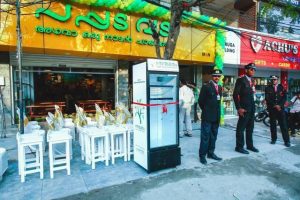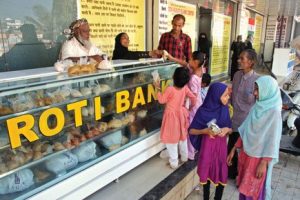Nanma Maram is an initiative based in Cochin to feed the hungry homeless. The Street Store is a global pop-up store for the poor homeless people to fetch some clothes and footwear for free. Another initiative called Roti Bank provides food to elderly and homeless after collecting them from different sources. The thought behind all these initiatives is serving the underprivileged with dignity and trust.
While we talk about rising numbers of development, routine sights of hungry and homeless stranded on roads and other public places haunt us. Growing GDP has been unable to eradicate poverty from India. Affected by such conditions, many people have been taking up the tasks on themselves. Resultant are some initiatives like the above mentioned three among many others in the country.
A young banker-turned-entrepreneur Minu Pauline owns a restaurant called Pappadavada in Cochin. March 23rd will mark one year of this unusual bistro. What makes the restaurant different is a refrigerator placed outside the eatery joint. The fridge is open 24*7 for all; people can refill it with food and poor hungry can take away food from it. Pauline keeps at least 50 packets of meal daily.

“The idea behind Nanma Maram (tree of goodness) was to ensure there is no wastage of food. As a restaurateur, we ended up wasting food. That is when I thought that instead of throwing it why not set up platform for exchange of food for the needy. Today, we have about 50-100 people eating from the joint daily; mostly these are migrant workers in our neighbourhood who sleep on the streets and have hardly any money,” said Pauline while speaking to The CSR Journal.
Local residents also keep food in the refrigerator regularly; especially when there are social functions.
The thought has been replicated by others too in several parts of the country. “I have known of about six places in Kerala, Delhi and Mangalore where they were inspired by Nanma Maram have followed the idea. It is good to see this happening as it doesn’t cost much but is highly effective. The good part is these are not only restaurants but also include a church, a business office and group of local residents,” Pauline added.
In another initiative called Roti Bank, food is given out to elderly and homeless for free. This cooked food is collected from individuals and institutions, packed neatly before giving out to the needy. Details of the donors are taken before they deposit food in the bank so that in case of any quality issues, the food depositors can be alarmed about it.

The Street Store is first of its kind rent free, premises free, pop-up clothing store where destitute can shop for free. These pop-up stores can be organised by anyone for any community. People can come and put their clothes in the hangers hung by roadside and keep their footwear there too. The homeless can come and choose what they want with dignity.
Karthik Raman, Chief Marketing Officer, IDBI Federal said, “We recently organised a Street Store in Mumbai near the Dharavi slum. We received feedback saying the poor took long time to choose from the apparels at display while they enjoyed the experience of shopping for free. Each member could pick three pairs of clothes and a pair of footwear.”
The good part of this model is donors get a chance to meet the beneficiaries. Many donors turn volunteers during such drives. Such models act as vibrant platforms for exchange of not only goods but also smiles and content. The basic model of such initiatives is based on trust and compassion. While it will be good to see more numbers of these initiatives, why limit it to merely food and clothing? We can certainly have them for other necessities too.
“Most people end up giving things to NGOs and are unaware where their donations go. It will be good to see the concept replicated for other goods and activities like books, stationery, teaching, and hobby shop among many others. Effective training and guidance on some hobbies can also help the poor build a source of revenue for themselves,” said Raghav.
Pauline’s fridge is a small idea but a fantastic way to execute CSR for small businesses like restaurants and food outlets. A garment shop can establish a similar platform for clothes, a stationery shop for books and other requirements for education of poor and so on. The model can channelise the exchange in the social development sector in a very transparent way.
Thank you for reading the story until the very end. We appreciate the time you have given us. In addition, your thoughts and inputs will genuinely make a difference to us. Please do drop in a line and help us do better.
Regards,
The CSR Journal Team

